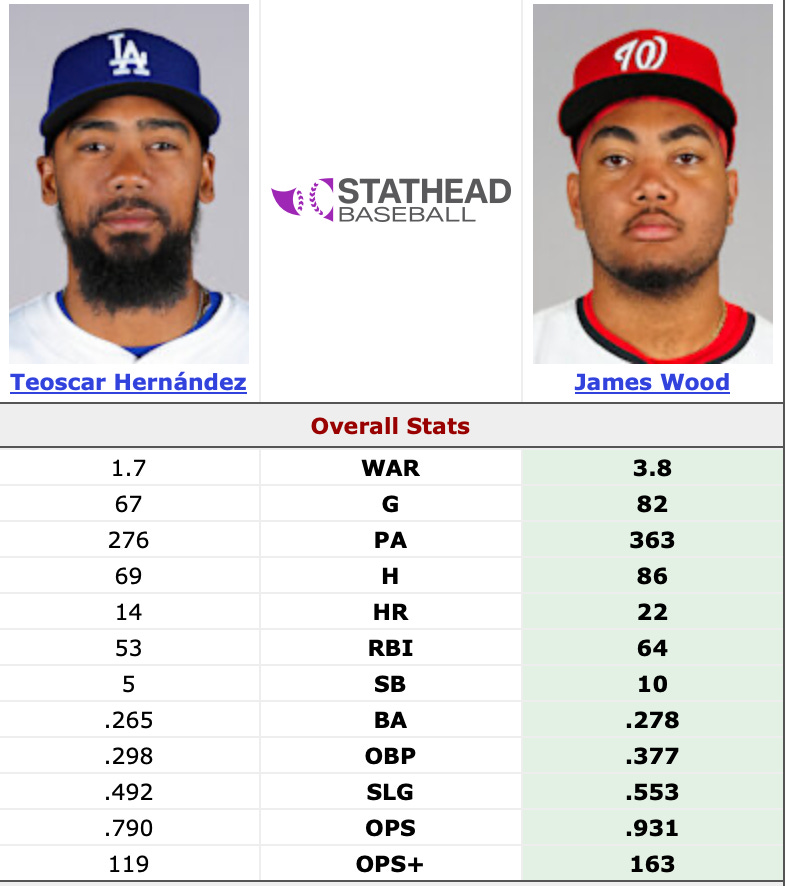The All-Star Game starter voting is, essentially, a pure popular vote just like electing a president would be without the Electoral College. It sounds democratic…but in baseball, it leads to:
Big Market Domination: Teams like the Dodgers, Yankees, Mets and Cubs have gigantic fanbases who overwhelm online ballots.
Small-Market Snubs: Breakout stars on small-market teams can be completely overlooked because their fanbase is smaller, even if they’re statistically dominant.
A perfect 2025 example: James Wood, the Nationals phenom. Instead, we have Teoscar Hernandez as a finalist for the game. Seriously, this is comical.
How the Electoral College Works (Quick Primer)
In U.S. presidential elections, the Electoral College assigns each state a number of “votes” based on population (# of representatives in the House plus two senators.) It’s designed to ensure that smaller states still matter, so New Hampshire isn’t steamrolled by California every four years.
It’s not perfect (cue the 1824, 1876, 2000, and 2016 electoral drama), but it’s rooted in one core idea: Big populations shouldn’t decide everything. Smaller regions deserve a voice.
Baseball is facing a dilemma where teams are being railroaded by the Dodgers, Cubs, and Mets. Of the 16 finalists for the National League this year, 13 of them come from those three teams….. It is a broken system and it is evident to everyone.
Translating This Idea to Baseball
So, what if we borrowed the Electoral College concept for the All-Star Game?
Instead of pure popular vote:
Each MLB team franchise becomes a “state.”
Each team gets, 3 “electoral votes” to cast for each position.
Fans in each market vote only for their team’s electoral votes.
How Local Voting Would Work
Imagine the Nationals are their own “state.”
MLB assigns 3 electoral votes to each market. (MLB tracks where you are when you vote, sorry!)
Nationals fans cast votes only within the Nationals market. (You would have to select what team you root for when you enroll to vote.)
They’d choose who they want for each position—including, but not limited to, Nationals players.
So if Nationals fans overwhelmingly vote for James Wood to start in the NL outfield:
The Nationals’ 3 electoral votes go to James Wood for that spot.
Of course, he would need more than those 3 electoral votes, but he can get them from other markets, which he probably would. Baseball fans are loyal, but they also respect game. As a Red Sox fan, I would not be voting for say Romy Gonzalez for the 1B All-Star.
Advantages of “Electoral Baseball”
Balances Big vs. Small Markets
Kansas City’s votes count equally alongside New York’s.
Prevents Ballot Stuffing
No single fanbase can overwhelm the entire league. The 1957 Cincinnati Reds fiasco (when fans voted 7 Reds into the starting lineup) wouldn’t be possible today.
Rewards Local Loyalty
Fans have real influence on sending their stars to the game.
More Diverse Rosters
All-Star teams might feature players from every corner of the league, not just big-market superstars.
Possible Drawbacks
There are of course some drawbacks to this.
Stars in big markets could be left off the roster even if they deserve it. (happens already.)
The system might get complicated (international votes would be difficult, but again if you choose what team you are a fan of at the start of enrollment it should work.)
Imagine the conspiracy theories if the All-Star Game gets decided by a few “swing teams” like the Brewers or Mariners.
Look, America has its issues with the Electoral College, but at least Wyoming still matters. Maybe it’s time the same was true for the Royals, Pirates, and Nats.
If you haven’t already, please consider subscribing below! It’s free!





So funny, but I love the idea. Awesome article!